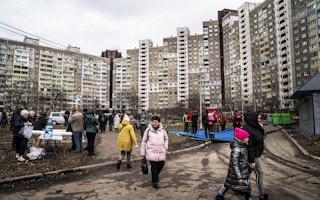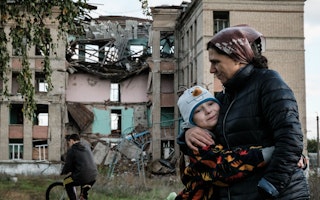Beyond the War, Ukraine Must Win the Peace and Recover
By Oleksandr Sushko & Inna Pidluska

Three years ago, Ukraine was plunged into a nightmare from which it is still battling to awake. Russia’s full-scale invasion, occupation and decimation of cities, kidnapping of children, and executions of civilians has taken an unbearable toll. A new U.S. administration pursues an illusory peace that threatens to hand vast concessions to Moscow, while Putin’s drones menace the Kyiv skies. But the country remains resilient, bolstered by a civil society striving to ensure that it will be Ukrainians who shape the nation’s destiny.
Reconstruction is an ongoing process that cannot wait until the war ends. Every day countless Ukrainians are adapting to displacement, returning from abroad to devastated communities, or adjusting to civilian life after serving in combat. But society too must adjust to the new realities of welcoming back such a substantial number of traumatized people who need access to public services, housing, and jobs. Ignoring their situation risks aggravating community tensions, which is why such a great emphasis is put on social cohesion and a human-centric recovery.
The scale of those in need is colossal. Russia’s relentless bombardment of housing and infrastructure seeks to multiply the 4 million internally displaced people (IDPs) already registered. The current total of 1.4 million veterans could soar to 5 million by the war’s end, including immediate family. After a decade of repelling occupation, subjugation, and invasion, Ukraine is fighting to maintain adequate services to ensure that these disparate groups get a proper recovery and reintegration, as well as accommodating several million more returnees.
It is not just with military campaigns that Ukraine counters Russian repression, but by continuing to be a stable and inclusive European democracy. When the geopolitical winds are against the country, public trust in robust and accountable institutions at national, regional, and local level is more crucial than ever. And this can only be achieved by ensuring the maximum amount of participation in public life. Civil society efforts are not only directed toward mitigating the impact of the war on vulnerable groups, but actively facilitating their reintegration and encouraging their involvement in the strategic planning and decision-making process of rebuilding their fractured communities.
While humanitarian aid, shelter, and health care continue to be in high demand, our partners are supporting IDPs to establish connections with local government representatives, restore lost documentation, and seek compensation for destroyed property. Our grants also support advocacy and leadership training in displaced communities, including bereaved families, people with disabilities, and other groups acutely affected by the war, to boost their involvement in decision-making processes, strategic planning, and activities at regional and local levels.
Soldiers in combat may make for compelling media coverage, but away from the cameras those leaving the battlefield face uphill struggles. The recent scaling back of U.S. government support will have a grave impact, and some international donors are reluctant to fund veteran-related projects. There is a major risk of marginalization and radicalization of veterans if reintegration fails, which is why civil society has been stepping up. We support a network of veteran hubs that provide peer-to-peer psychological, social, and legal services, while engaging with the private sector to improve access to employment, expand training schemes, and develop veterans’ business plans.
But the work extends far deeper than addressing immediate needs. Veterans, from a modern fighting force much more representative of society than ever before, will form some of the most influential groups in a post-war Ukraine. Our partners have been helping to inform government policy on veterans’ affairs as well as supporting veterans themselves to self-organize and build strong associations. Healing physical and mental scars is a monumental challenge, as is countering the challenge of radicalization, but it is incumbent upon civil society to ensure that the traumatized can make a positive impact, and channel their experiences and grievances into constructive dialogue.
The upheavals and tensions cannot be downplayed, but considering the relentless full-scale terror visited upon the country over the last three years, it is remarkable how peaceful and cohesive Ukrainian society has remained. But we cannot take this for granted. There will be anger, blame, calls for vengeance, and deepening of tensions and fault lines, all of which will inevitably be exploited by hostile actors. But the country has refused to yield to these provocations so far. Ukrainians have already demonstrated to the world, and to ourselves, that we can win as a strong, free, and democratic society.
Oleksandr Sushko is executive director of the International Renaissance Foundation in Ukraine.
Inna Pidluska is deputy executive director of the International Renaissance Foundation in Ukraine.


